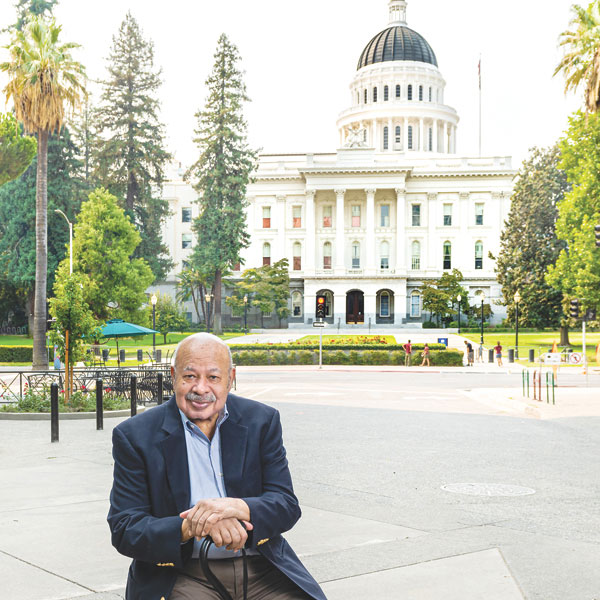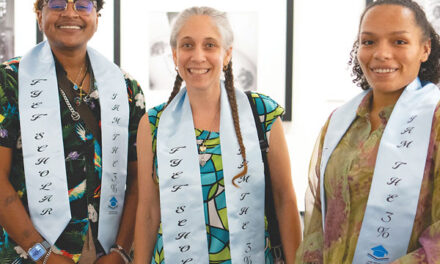In 1996, California voters approved a citizen-sponsored initiative—Proposition 209—that added the following words to the California Constitution: “The state shall not discriminate against, or grant preferential treatment to, any individual or group on the basis of race, sex, color, ethnicity or national origin, in the operation of public employment, public education or public contracting.”

This summer, our state Legislature voted to codify racial discrimination in state law by voting for a constitutional amendment—ACA 5—that would reintroduce racial preferences for who gets a state job or contract, or who is admitted to a state university. The amendment —Proposition 16 —will be on the Nov. 3 ballot. It would repeal Proposition 209.
For one local resident, these developments are deeply personal. Ward Connerly is considered the father of Proposition 209. I caught up with him to get his thoughts.
“In recent months, much attention has been focused on the destruction of historical monuments and statues, while very little attention has been focused on action by the California Legislature to erase Prop. 209, and the principle of equality that it represents, from the California Constitution,” Connerly says.
Connerly grew up in Sacramento and graduated from Sac State in 1962. In college, he was student body president and active as a Young Democrat. During his college years, he campaigned against housing discrimination and helped to get a state law passed banning the practice.
Ward Connerly founded the American Civil Rights Institute, a national nonprofit organization in opposition to racial and gender discrimination and preferential treatment. He’s president of Californians for Equal Rights, a nonprofit with a similar mission. After living in Idaho, the 81-year-old civil-rights warrior recently returned to Sacramento to join the fight against the new effort to overturn Proposition 209.
Connerly was a member of the University of California Board of Regents from 1993 to 2005. He led efforts to grant domestic partner benefits to gay and lesbian domestic partners in the University of California schools.
“My views on gay rights stem from my libertarian viewpoint that governments—including government-run universities—should not discriminate, whether it is by favoring some students because of their race, or by excluding others from spousal benefits based on their sexual orientation,” Connerly says.
While serving as a UC Regent, Connerly got an inside look at what he considered the “corruption” affirmative action introduced to colleges and universities. In response, he was asked lead the Proposition 209 campaign.
“Prop. 209 is only 37 words, no hidden words and no secret to it,” he says. “It is simple and it’s direct, but they want to repeal it, and the ballot label that will guide the voters says that this is an effort to allow diversity. America’s experiment with democracy will fail if we divide our people into racial enclaves and allocate jobs and contracts and college admissions on that basis.”
He continues, “The repeal effort received a boost from the killing of George Floyd, no matter the irony of voting for discrimination by race in the name of eliminating discrimination by race. In other words, if the problem is police singling out African American young men without cause, how is the answer to sort people by race in other areas of life, sowing resentment and pitting American against American?
“George Floyd was murdered. How else to describe what was done to a man who was handcuffed, wrestled to the ground and forcibly restrained by four men, one of whom put his knee and the full weight of his body on Floyd’s throat for roughly nine minutes? After due process is afforded, swift punishment must be meted out to those responsible for his death.”
There are key differences between today and 1996, Connerly says. “Today, the effort to keep racial discrimination out of California is led by Asian Americans. They realize that their children are likely to be the victims of disparate treatment if Prop. 16 goes through, especially in college admissions,” he says. “In 2014, the Legislature dropped an effort to repeal Prop. 209 because of Asian American opposition, but this time those opponents were crushed.”
Last November, voters in Washington state narrowly defeated a similar amendment, though opponents were vastly outspent by those favoring racial preferences. California is a more liberal state. Its political class and nearly all media will support repeal. As in Washington, opponents of Proposition 16 are massively under-funded.
Many believe Blacks are at a disadvantage despite anti-discrimination laws. They say the problem isn’t that we don’t officially prohibit many forms of discrimination. Instead, the problem is that a significant number of Americans fail to enjoy the full measure of the same opportunities and freedoms that are taken for granted by so many of us.
Supporters of affirmative action argue “race blind” admission policies that select applicants based on purportedly objective metrics like SAT scores or recommendation letters only re-enforce existing inequalities. They also believe a new generation should have a chance to make the decision on Proposition 209.
But others agree with Connerly and believe judging individuals by the color of their skin is antithetical to equal justice under the law. “Skin color shouldn’t matter. The only way we get it to not matter is to stop making it matter,” he says.
Now it’s up to the voters. It remains to be seen if Californians will vote to hold onto what Connerly calls an American principle of equality that goes back to the Declaration of Independence, the 14th Amendment and the civil-rights movement. Or if voters will allow our state again to allow preferences based upon race, sex, color, ethnicity or national origin to try to achieve equality.
SUPPORT INSIDE
Please sign up for our Inside Sacramento weekly newsletter with even more local news than we deliver in print. Also, consider an Inside membership starting at $19.95 a year. Visit insidesacramento.com/shop. And TAKE THE 100% LOCAL PLEDGE!
Cecily Hastings can be reached at publisher@insidesacramento.com. Follow us on Facebook, Twitter or Instagram: @insidesacramento.com.
















